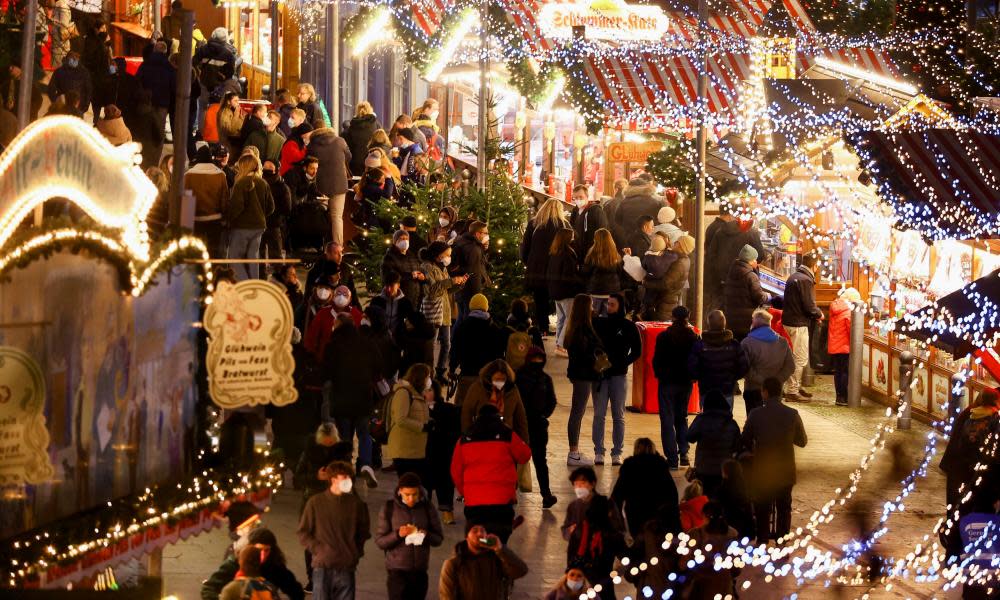Germany ‘at crossroads’ as Covid cases surge across Europe

Germany’s top health officials have raised the prospect of a national lockdown, warning that a rapidly rising number of coronavirus cases and a dramatic increase in the number of patients in intensive care meant contact reduction was the only way of tackling the crisis and avoiding “the road to chaos”.
“We need a massive contact reduction immediately,” said Prof Lothar Wieler, the head of the Robert Koch Institute, Germany’s federal disease control agency.
He called on political leaders to utilise all available measures to prevent gatherings in large numbers and to urge the public to avoid any unnecessary contacts with people outside their own households, as the incidence rate in Germany rose by 75,400, a week-on-week increase of 44%.
Related: Most Germans to be ‘vaccinated, cured or dead’ within months, says minister
“I expect right now for the decision-makers to trigger all measures in order that we can bring down the incidence rate together,” Wieler said. “We are at a crossroads. We have one choice. Either we choose the road that leads to chaos and to a bad end … or the one which unburdens the health system and maybe enables a peaceful Christmas.”
Germany’s outgoing health minister, Jens Spahn, called the situation “dramatically serious, to the extent that it has never been at any point in this pandemic”. He added: “It is half an hour after midnight, but some people have still failed to hear the alarm.”
Of 22,000 available intensive care beds in Germany, 4,000 are occupied with coronavirus patients, 85% of whom need breathing assistance. Their average age is between 50 and 79 years. Wieler said while the figure might not seem that high to some, it marked an increase of 100% in a week, and even if there were no new infections, 1,000 more patients could be expected to end up in intensive care within the next 10 to 14 days. Elective surgery around Germany has been cancelled to free up beds and staff.
Germany’s air force is on call to transport patients from full hospitals to those with capacity.
Spahn called for decision-makers on the federal and state level to recognise the urgency of the situation and bring forward a meeting planned for 9 December. He said it would be foolhardy to wait for 10 days, as the participants had said they planned to do, in order to see whether the current measures in place were working.
“The medical staff don’t have 10 days to wait and see,” Spahn said. He criticised the fact the Christmas markets were in full swing in Berlin while the city’s university hospital, the Charité, was full. “It is just not appropriate at this time,” he said.
Wieler also expressed his concern over the newly detected variant in southern Africa.
Both men urged Germans to get vaccinated or, if they had already done so, to get booster shots. Spahn said that between 20 and 30m vaccines would be administered before Christmas. Just over 68% of Germans have been fully vaccinated.
Incidence rates across Europe are rising fast. Portugal, which has vaccinated 86% of its population, is reintroducing a series of restrictions as cases continue to rise. On Thursday the prime minister, António Costa, announced that from 1 December, face masks would once again be obligatory in enclosed spaces and that a digital certificate showing vaccination or recovery would be needed to enter restaurants, hotels and cinemas. All those entering hospitals, care homes, bars, clubs and sports events will need to show a negative test, while those flying into Portugal from abroad will also need a digital certificate or a negative test result.
default
Catalonia – which had become the latest Spanish region to decree that Covid passports are needed to get into bars, restaurants, gyms and care homes – was forced to suspend the requirement until at least Monday after “very intense” demand crashed the system for downloading the passes. The passports are also in use in Aragón, the Balearic islands, Galicia, Murcia and Navarre, but their specific use varies between regions.
Meanwhile, the Spanish government has said plans to restrict flights from South Africa and Botswana will be proposed at the next cabinet meeting, which is scheduled for next Tuesday. To date, 89.2% of Spaniards aged over 12 have received two doses of the vaccine.
In the Netherlands the government is due to announce new measures on Friday to tackle a rise in infections. Despite about 85% of the adult population being fully vaccinated, cases hit a record high of nearly 24,000 on Wednesday, about 40% more than the previous week, with hospitals close to capacity. This month the government reintroduced mask-wearing and ordered bars and restaurants to close at 8pm.
Switzerland is planning a referendum on Sunday in which voters can decide on how far the national government’s powers to respond to the pandemic can go. The question will focus on whether the government has the continued authority to insist on certificates to enter bars, restaurants, cultural and sporting events. Cases there are rising and just over 65% of the population is fully vaccinated, one of the lowest in Europe.
Austria became the first country in western Europe to re-enter lockdown on Monday and also announced a vaccine mandate from February.
It was followed by neighbouring Slovakia, which on Wednesday entered a two-week lockdown after the health ministry said that hospital admissions had reached a “critical point”. Less than 50% of the population is fully vaccinated.


